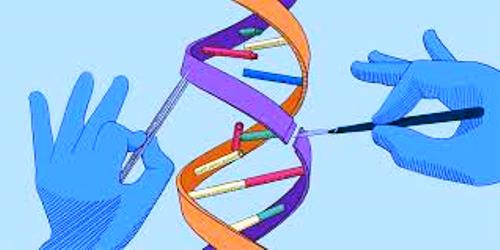A scientist at the African Union Development Agency (AUDA-NEPAD), Prof. Olalekan Akinbo has emphasized the need for effective policies to address critical issues such as biosafety, intellectual property rights, and public acceptance.
Speaking via a telephone interview on Monday, Akinbo said these policies must align with the guidelines provided by the Cartagena Protocol on Biosafety and national biosafety laws.
He noted that science policy specifically focuses on actions intended to enhance the efficiency and effectiveness of public investment in research.
“The policy landscape for genome editing features a dynamic interaction among policy, science, and practice, forming a triangle that ensures technology development aligns with societal needs and ethical considerations.
“At global and continental levels, regulatory frameworks play a crucial role in the safe and ethical application of genome editing,” he said.
Genome editing is a technique used to make precise changes to the DNA of a cell or organism.
Akinbo, who serves as the Technical Lead of the Genome Editing Initiative at the AUDA-NEPAD Centre of Excellence in Science, Technology, and Innovation, stressed that collaboration between researchers and policymakers is essential to ensure that scientific advancements align with policy goals.
NAN reports that CRISPR (Clustered Regularly Interspaced Short Palindromic Repeats) is a revolutionary gene-editing technology derived from a bacterial defense system. It enables scientists to target and modify specific DNA sequences in living organisms, with potential applications in treating genetic diseases and improving agricultural crops.
To ensure the adoption and economic impact of genome editing technologies in Africa, Akinbo highlighted the importance of pragmatic extension services, education, and training programmes to equip farmers with the necessary knowledge and skills.
He also called for public awareness campaigns to build trust and acceptance of the technology.
He explained that global and continental development frameworks, including Agenda 2030, the Sustainable Development Goals (SDGs), and Agenda 2063 of “The Africa We Want,” all underscore the urgent need to eradicate hunger.
Specifically, he pointed out that SDG Goal 2, established by the United Nations in 2015, aims to eliminate hunger, ensure food security, improve nutrition, and promote sustainable agriculture.
He added that Goal 6 of Aspiration 1 under Agenda 2063 emphasizes the modernization of agriculture to achieve greater productivity and output.
Additionally, Akinbo noted that the 10-Year Science, Technology, and Innovation Strategy for Africa (STISA) prioritizes the use of science and innovation to eliminate hunger and achieve food security.
“In this context, genome editing presents a timely opportunity to boost agricultural output and address the persistent issue of food insecurity in Africa,” he said.
In 2022, the African Union High-Level Panel on Emerging Technology (APET) developed a policy framework to guide the application of genome editing in African agriculture.
Akinbo said that member states were provided with clear guidelines for the technical and safe application of genome editing tools.
He further disclosed that APET recommended regulatory policies that enable the evaluation of genome-edited products by assessing their similarity to natural products or those developed through conventional breeding methods.
This includes evaluating genome-edited products that involve specific genetic modifications such as gene knockouts and deletions, he added.


